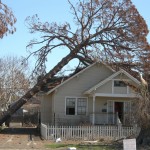By Evan Rosenberg, faculty member, Emergency and Disaster Management at American Public University
Living on Florida’s Gulf Coast means dealing with hurricanes and their after-effects. The impact of a storm can affect one’s life for months, if not years, after it makes landfall. Survivors may be facing loss of job, loss of child-care options, loss of value in the residence, and more. Throw in the added stress caused by the destructive nature of the event, and things may seem insurmountable. This is where being prepared comes in.
Here are some easy preparatory steps to take in the advance of a storm’s arrival:
- Have a 72-hour food and water supply
- Stock up on batteries, flashlights, and candles
- Have a 30-day supply of vital medicines available
- Drain your pool before the event
- Remove patio and lawn furniture, trash cans, and potted plants and store inside

Conduct an annual insurance review and make sure your agent explains all the important details of your coverage. Understand what is covered (e.g. water that came in from above: rainwater), and what is generally not covered (e.g. water that comes in from below: floodwater). Understand whether your policy pays out for replacement value (the current cost) or market value (the price after depreciation is factored in). Finally, and this is important if you live in a condo or co-op, research your building association’s insurance and learn what is covered (or not covered) by that policy.
Find out ahead of time how your local government will pass on official information during the cleanup stage. Remember that after a large or catastrophic event, power for your electronic devices may become an issue! Once the means of communication is stabilized, be on the lookout for official information such as: times and dates of debris collection, how to properly separate different types of debris for collection, and what to do if you see downed power lines.
Finally, be careful when choosing a contractor to help with debris cleanup and repairs. Important questions to ask of any potential contractor include:
- Are you licensed?
- Do you offer a warranty on the work?
- What percentage of the money do you want up front for the work?
- Are there other jobs that could pull you away from my work before it is finished?
- What would your prices normally be for this work had there been no disaster?
Get references from friends, neighbors, family, your insurance company, or any other trusted sources. Remember, if the deal being offered to you seems too good to be true, it probably is!
About the Author: Evan Rosenberg is a faculty member in Emergency and Disaster Management at American Public University. He currently serves as the Bureau Chief of Recovery for Florida’s Division of Emergency Management. Having been with the agency for more than five years, Mr. Rosenberg has been activated for five federally declared disasters, and has performed “blue sky” work on more than 20 federally declared disasters, where his bureau is responsible for administering $5 billion in Stafford Act recovery funding. A graduate of Florida State University College of Law, Mr. Rosenberg has taught graduate-level courses in emergency management at both Florida State University and American Public University.
Comments are closed.